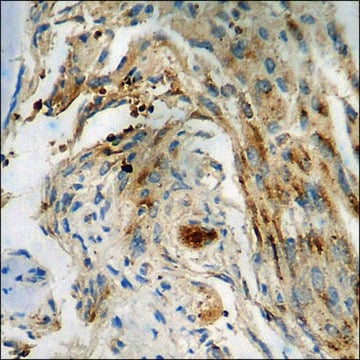Fontos dokumentumok
C9358
Anti-Chk1 antibody, Mouse monoclonal
~2 mg/mL, clone DCS-310, purified from hybridoma cell culture
Szinonimák:
Anti-CHK1
About This Item
Javasolt termékek
biológiai forrás
mouse
Minőségi szint
konjugátum
unconjugated
antitest forma
purified from hybridoma cell culture
antitest terméktípus
primary antibodies
klón
DCS-310, monoclonal
Forma
buffered aqueous solution
molekulatömeg
antigen 54 kDa
faj reaktivitás
human
koncentráció
~2 mg/mL
technika/technikák
immunohistochemistry (formalin-fixed, paraffin-embedded sections): suitable
immunoprecipitation (IP): suitable
microarray: suitable
western blot: 1-2 μg/mL using whole extract of cultured 293T (human embryonal kidney) cells
izotípus
IgG2b
UniProt elérési szám
kiszállítva
dry ice
tárolási hőmérséklet
−20°C
célzott transzláció utáni módosítás
unmodified
Géninformáció
human ... CHEK1(1111)
Related Categories
Általános leírás
Immunogén
Alkalmazás
- immunoprecipitation
- immunohistochemistry
- immunoblotting
Biokémiai/fiziológiai hatások
Fizikai forma
Jogi nyilatkozat
Nem találja a megfelelő terméket?
Próbálja ki a Termékválasztó eszköz. eszközt
Tárolási osztály kódja
10 - Combustible liquids
WGK
nwg
Lobbanási pont (F)
Not applicable
Lobbanási pont (C)
Not applicable
Válasszon a legfrissebb verziók közül:
Analitikai tanúsítványok (COA)
Nem találja a megfelelő verziót?
Ha egy adott verzióra van szüksége, a tétel- vagy cikkszám alapján rákereshet egy adott tanúsítványra.
Már rendelkezik ezzel a termékkel?
Az Ön által nemrégiben megvásárolt termékekre vonatkozó dokumentumokat a Dokumentumtárban találja.
Tudóscsoportunk valamennyi kutatási területen rendelkezik tapasztalattal, beleértve az élettudományt, az anyagtudományt, a kémiai szintézist, a kromatográfiát, az analitikát és még sok más területet.
Lépjen kapcsolatba a szaktanácsadással








